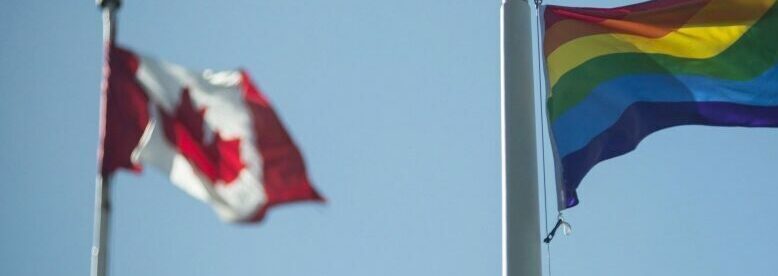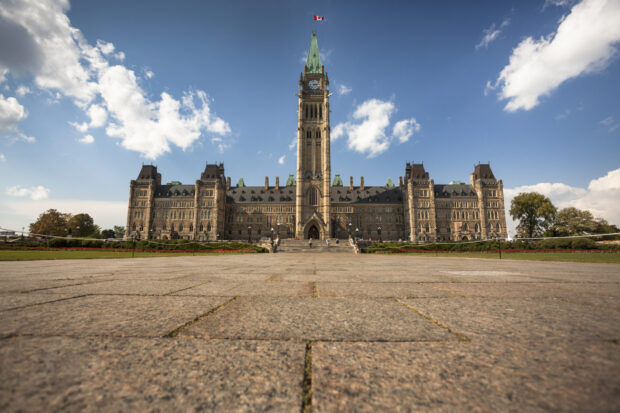In more than 60 countries, LGBTQI+ people are criminalized because of their sexual orientation, gender identity or gender expression. As a result, many LGBTQI+ people experience severe forms of violence, persecution, and discrimination in their home country, usually incited by state actors, leaving them with little recourse but to flee. State-sanctioned homophobia and transphobia force LGBTQI+ people to live in constant fear for their lives. They are also subjected to community violence, family violence and rejection, and are denied basic human rights, such as access to education, employment, healthcare, and legal protections. Forced to flee, they seek refuge in countries like Canada, where they can live safely with dignity and contribute to society without fear of persecution.
Accessing humanitarian protection and resettlement programs
Humanitarian protection and resettlement programs are not always safe and accessible for LGBTQI+ refugees and asylum seekers. Options for many individuals are restricted because of passport immobility, visa restrictions, high costs, danger in transit countries and refugee camps, the intimate nature of ‘proving’ LGBTQI+ persecution, retraumatization, and a limited number of available resettlement spaces. Some LGBTQI+ refugees and asylum seekers also experience homophobia and transphobia on their journey in search of safety. The majority of refugees and asylum seekers are in fact hosted in countries that criminalize or restrict LGBTQI+ identity, intimacy, expression, or association to some degree. While there are several organizations that work to provide refuge for the more than 120 million forcibly displaced people – including over 43 million refugees, only a handful focus on LGBTQI+ people who have been forcibly displaced. Rainbow Railroad is one such organization. We work at the intersection of LGBTQI+ criminalization and forced displacement. Over the past 18 years, we have experienced a significant increase in the number of LGBTQI+ people reaching out to us for help after being abandoned by their state, community, family, and sometimes the humanitarian protection system. One of the ways that we intervene and offer support is by improving their access to humanitarian protection and resettlement programs.
Canada’s commitment to LGBTQI+ refugees and asylum seekers
Canadian immigration regulations explicitly recognize the need for protections for LGBTQI+ people facing discrimination or danger in their home countries. By providing humanitarian protection and resettlement options for LGBTQI+ refugees and asylum seekers, Canada is upholding its existing legal obligations and frameworks for refugee protection. Rainbow Railroad works with the Government of Canada, community partners, LGBTQI+ refugees and asylum seekers, and the broader 2SLGBTQIA+ community in Canada to improve access to protection and resettlement for at-risk LGBTQI+ people. By doing so, we aim to ensure that LGBTQI+ refugees and asylum seekers find safety, home, and belonging when they relocate here.
Rising Anti-Refugee Narratives
Unfortunately, this critical work is now under threat. While refugees make up a fraction of the newcomers in Canada, “the heightened debate about immigration has bled into how the public views [them]”. Refugees are unfairly being made scapegoats for issues like Canada’s housing crisis and economic challenges, bearing the brunt of misguided accusations that misplace blame on them. There is also a growing narrative that “many people claiming to be refugees are not real refugees”. The unintended consequence of this is the creation of a dangerous and divisive narrative which adds another layer of complexity and precarity for at-risk LGBTQI+ people who are seeking asylum in Canada because they were being persecuted in their home countries. This, even as Canada remains a beacon of hope for these individuals and has consistently demonstrated its commitment to protecting those who face persecution based on their race, religion, nationality, political opinion, and other protected grounds, including sexual orientation, gender identity, and gender expression.
Continued Partnership for LGBTQI+ refugees and asylum seekers
Rainbow Railroad believes that through continued partnerships and incisive planning, the Government of Canada can maintain, if not marginally increase the number of LGBTQI+ refugees and asylum claims it accepts annually. At-risk LGBTQI+ people who are forced to flee home depend on the compassion of the Government of Canada, and a reduction in the number of individuals the IRCC will accept in the category of Refugees and Protected Persons from a planned high of 93,000 in 2024 to a planned high of 60,000 in 2027 hurts the increasing number of individuals who are forced to flee home.
A balanced, partnership-centric approach to supporting LGBTQI+ refugees and asylum seekers can uphold Canada’s core values without straining the economy or overburdening taxpayers in the long term. Over time, refugees contribute to Canada’s GDP and “pay more in income tax on average than they receive in public benefits and services”. Furthermore, data show that refugees have one of the highest rates of tax compliance in Canada.
Supporting LGBTQI+ refugees and asylum seekers may require additional initial investments in specialized programs, such as mental health support, trauma counseling, and legal aid to navigate asylum claims; these costs are short-term investments in ensuring that LGBTQI+ refugees and asylum seekers are successfully integrated into Canadian society. By providing the necessary support at the outset, Canada can reduce the long-term burden on social services and promote greater self-sufficiency among this population.
Holding the line on the commitment to LGBTQI+ refugees and asylum seekers
Rainbow Railroad calls on the Government of Canada to take the following actions.
- Invest in technology and procedural reforms to streamline and swiftly process refugee claims; this will reduce wait times, improve cost-effectiveness, and ensure that LGBTQI+ refugees and asylum seekers are given timely protection. Following the COVID-19 disruption to the in-person Refugee Status Determination hearings, the Immigration Refugee Board revolutionized its case intake and utilized videoconferencing to hold hearings, which improved efficiency and reduced backlog.
- Expand regional access to resettlement pathways for at-risk LGBTQI+ people. Right now, access to resettlement pathways to Canada is limited to individuals in certain countries or regions.
- Enhance its collaborative effort with Rainbow Railroad, and local and international partners to secure positive relocation outcomes for LGBTQI+ refugees and asylum seekers using the whole-of-society approach.
- Maintain the planned 2024 immigration level for Refugees and Protected Persons over the next three years to ensure that LGBTQI+ refugees and asylum seekers are not abandoned because of their vulnerability.
- Bolster the private sponsorship of refugees program through sponsorship agreement holders and partnerships with LGBTQI+ advocacy and community organizations; this leverages community resources, reduces government spending, and creates a strong network of support for LGBTQI+ refugees.
- Disrupt the current dangerous and divisive policy and populist narrative that refugees and asylum seekers are causing the housing crisis in Canada. Refugees and asylum seekers make up a small fraction of Canada’s overall population, and their presence does not meaningfully contribute to this crisis.
It is possible to protect and support at-risk LGBTQI+ refugees and asylum seekers through a cost-effective, targeted approach that ensures successful integration into Canadian society. A nation that prides itself on justice and compassion must not allow vulnerable populations to become victims of a misleading, dangerous and divisive narrative in the face of complex socio-economic challenges. We must work together to uphold the values of inclusivity and human dignity that have long defined Canada’s approach to humanitarian protection and refugee resettlement.


